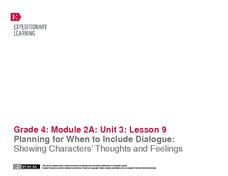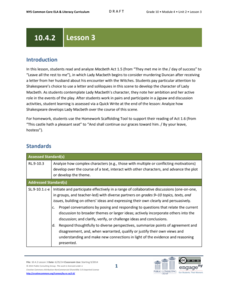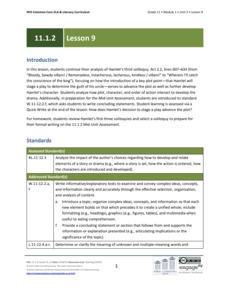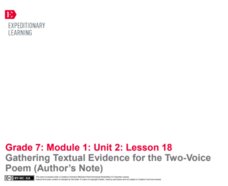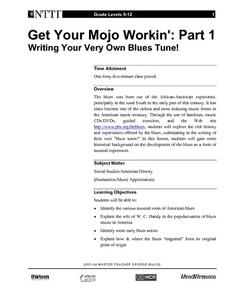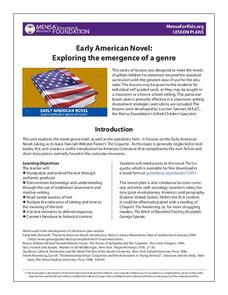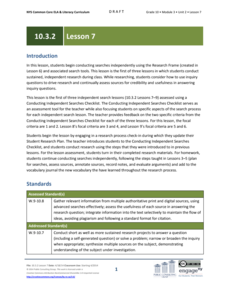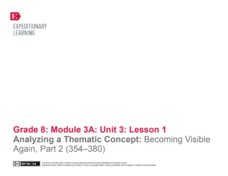EngageNY
Planning for When to Include Dialogue: Showing Characters’ Thoughts and Feelings
Young writers examine dialogue conventions, including indentation, quotation marks, and expressing thoughts and feelings through a fictional text. By noticing where and when authors use dialogue, they decide how to incorporate dialogue...
EngageNY
Grade 10 ELA Module 4: Unit 2, Lesson 3
How does Lady Macbeth's ambition help advance the plot of Shakespeare's Macbeth? Scholars explore the topic using discussion and a jigsaw activity. Next, they complete a quick write to analyze how Shakespeare develops Lady Macbeth's...
EngageNY
Grade 11 ELA Module 1: Unit 2, Lesson 9
Hamlet has an unusual take on the criminal justice system when he decides to determine his uncle's guilt by staging a play. With the resource, scholars continue analyzing Hamlet's third soliloquy from Act 2.2 of Shakespeare's Hamlet....
EngageNY
Grade 9 ELA Module 3, Unit 2, Lesson 9
Part of being a strong researcher is knowing if you're headed in the right direction. Class members study their research frames formulated in the previous lessons of the unit and decide what parts of their inquiry paths need revision or...
EngageNY
Gathering Textual Evidence for the Two-Voice Poem (Author’s Note)
Writers take a look at how to gather evidence from the information text in the unit that connects to Salva and Nya’s story. They complete a Gathering Evidence from Informational Texts sheet to guide their work. Pupils then use the...
Constitutional Rights Foundation
Plyler v. Doe: Can States Deny Public Benefits to Illegal Immigrants?
Illegal immigration is an ever-changing source of consistent controversy. A reading passage about the rights of undocumented workers and illegal immigrants—and the lack thereof—guides high schoolers into a mock trial activity. Three...
EngageNY
Arithmetic and Geometric Sequences
Arithmetic and geometric sequences are linear and geometric patterns. Help pupils understand the relationship and see the connection with an activity that asks them to write the rules and classify the patterns correctly. A sorting...
Curated OER
Summing it all Up...In Your Own Words
Learners observe and demonstrate the steps to identifying the main ideas of a text. They listen to the teacher read a paragraph and model the steps of summarizing the main idea. Students then independently read a different paragraph...
Curated OER
Picture the Process
Learners read Chasing Vermeer and relate the book to the author . In this writing process instructional activity, students view Blue's Photo Album and see how the author writes and revises her work. Learners discuss the process that all...
Curated OER
Jeffrey and Sloth
Students listen to the story Jeffrey and Sloth and explore the six traits of writing. In this six traits of writing lesson, students practice doodling as a method of brainstorming ideas. Students then discover the importance of...
Curated OER
Speak Anticipation Guide
Although labeled an anticipation guide, this plan is designed to be used about 22 pages into Speak, by Laurie Halse Anderson. A guide is provided with 10 statements. As they read each one, they mark whether or not they agree and whether...
Consortium for Ocean Science Exploration and Engagement (COSEE)
Understanding the Food Web
Building on prior knowledge of the pervious lesson in the series, pupils explain the previous lesson to each other. Then they write a simple guide for a young child to read on the same topic.
Curated OER
Freak the MIghty: Anticipation Guide
Friendship, family, and violence are the subjects of an anticipation guide designed to accompany Rodman Philbrick's young adult novel, Freak the Mighty. Individuals complete the included guide, discuss their responses in groups, and then...
Novelinks
Man's Search for Meaning: Anticipation Guide Instructions
To prepare readers for the major concepts in Victor Frankl's Man's Search for Meaning, an account of his life in Auschwitz, class members respond to a series of statements on an anticipation guide.
Curated OER
Mississippi Trial, 1955: Imagery Guide
Class members take on the role of jurors in this guided imagery activity designed to be used with chapter 15 of Mississippi Trial, 1955.
Laboratory for Atmospheric and Space Physics
Space Travel Guide
Looking to take a trip? Why not go to space? Here, scholars take on the role as travel agent to create a guide to their favorite planet including travel tips and sightseeing recommendations.
Curated OER
Cry, The Beloved Country: Anticipation Guide
“Poor people are poor because they are lazy and don’t work enough.” “If you are desperate, the means justify the ends.” Prior to reading Cry, The Beloved Country, class members complete an anticipation guide that focuses on issues raised...
Curated OER
Get Your Mojo Workin': Part 1 Writing Your Very Own Blues Tune!
Upper graders listen to the blues. They discuss blues scale, read a description of the blues, and work together to write an original piece. A lesson like this ties into American history and African-American musical contributions very...
MENSA Education & Research Foundation
Early American Novel: Exploring the Emergence of a Genre
Need an extra challenge for your best readers? Check out a unit that uses Hannah Webster Foster’s epistolary novel, The Coquette, published in 1797, as the anchor text. The resource is packed with project ideas; each with its own...
Santa Monica-Malibu Unified School District
Parts of Speech Adjectives: Building Blocks of Grammar
How do you describe a jellyfish? Individuals write adjectives for Nomura's jellyfish, take notes, and check understanding with a formative assessment. Notes include the definition for adjectives, guiding questions to help writers...
US Institute of Peace
Defining Conflict
Before there can be peace, we have to understand conflict. Introduce the concept of conflict through a two-part activity that combines discussion, collaboration, and writing. The first in a 15-part series examines the multiple meanings...
EngageNY
Grade 10 ELA Module 2: Unit 2, Lesson 6
How do authors use rhetorical devices and word choice to emphasize their ideas? Pupils consider the question while reading paragraphs 16–19 from Julia Alvarez's essay "A Genetics of Justice." Readers engage in evidence-based discussion...
EngageNY
Grade 10 ELA Module 3: Unit 2, Lesson 7
Scholars begin to work independently on their research ideas from the first six lessons. They use their previous work in the first six lessons and a research checklist to guide their work. To finish, they complete graphic organizers,...
EngageNY
Analyzing a Thematic Concept: Becoming Visible Again, Part 2 (354–380)
Scholars take a close look at the life of Louie in Unbroken. They discuss events considered turning points in their life and use several graphic organizers and guides to help direct their thinking. After thinking about their responses,...


